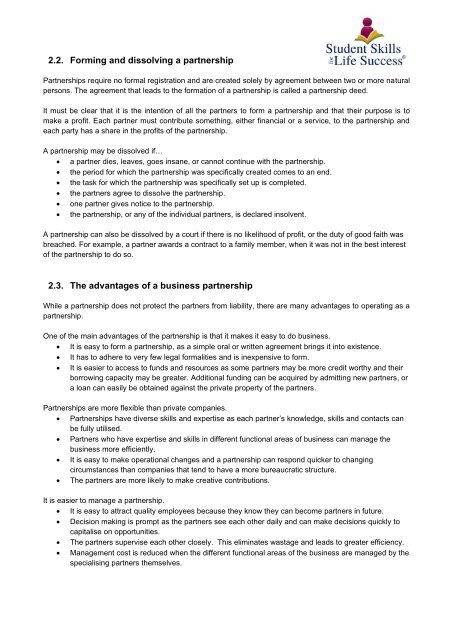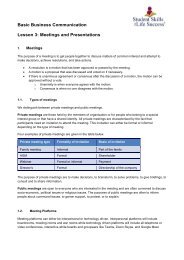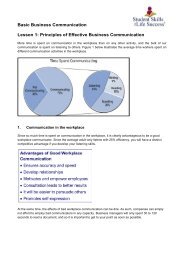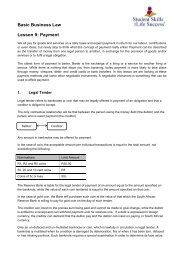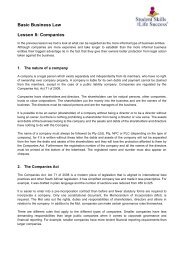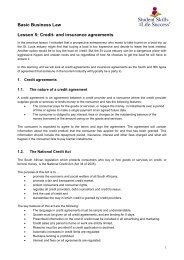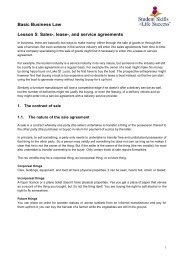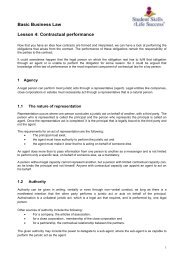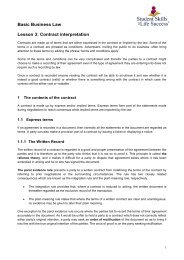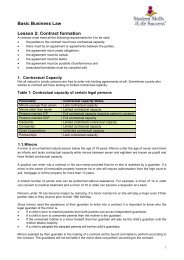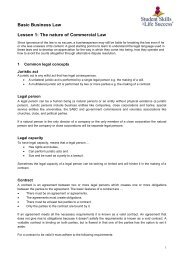Basic Business Law. Lesson 7. Smaller Business Entities
This is the seventh lesson of the "Student Skills for Life Success" "Basic Business Law" course. The topics covered in this booklet are: 1. Sole Traders 2. Partnerships 3. Close corporations 4. Trusts 5. Franchise Agreements
This is the seventh lesson of the "Student Skills for Life Success" "Basic Business Law" course. The topics covered in this booklet are:
1. Sole Traders
2. Partnerships
3. Close corporations
4. Trusts
5. Franchise Agreements
You also want an ePaper? Increase the reach of your titles
YUMPU automatically turns print PDFs into web optimized ePapers that Google loves.
2.2. Forming and dissolving a partnership<br />
Partnerships require no formal registration and are created solely by agreement between two or more natural<br />
persons. The agreement that leads to the formation of a partnership is called a partnership deed.<br />
It must be clear that it is the intention of all the partners to form a partnership and that their purpose is to<br />
make a profit. Each partner must contribute something, either financial or a service, to the partnership and<br />
each party has a share in the profits of the partnership.<br />
A partnership may be dissolved if…<br />
• a partner dies, leaves, goes insane, or cannot continue with the partnership.<br />
• the period for which the partnership was specifically created comes to an end.<br />
• the task for which the partnership was specifically set up is completed.<br />
• the partners agree to dissolve the partnership.<br />
• one partner gives notice to the partnership.<br />
• the partnership, or any of the individual partners, is declared insolvent.<br />
A partnership can also be dissolved by a court if there is no likelihood of profit, or the duty of good faith was<br />
breached. For example, a partner awards a contract to a family member, when it was not in the best interest<br />
of the partnership to do so.<br />
2.3. The advantages of a business partnership<br />
While a partnership does not protect the partners from liability, there are many advantages to operating as a<br />
partnership.<br />
One of the main advantages of the partnership is that it makes it easy to do business.<br />
• It is easy to form a partnership, as a simple oral or written agreement brings it into existence.<br />
• It has to adhere to very few legal formalities and is inexpensive to form.<br />
• It is easier to access to funds and resources as some partners may be more credit worthy and their<br />
borrowing capacity may be greater. Additional funding can be acquired by admitting new partners, or<br />
a loan can easily be obtained against the private property of the partners.<br />
Partnerships are more flexible than private companies.<br />
• Partnerships have diverse skills and expertise as each partner’s knowledge, skills and contacts can<br />
be fully utilised.<br />
• Partners who have expertise and skills in different functional areas of business can manage the<br />
business more efficiently.<br />
• It is easy to make operational changes and a partnership can respond quicker to changing<br />
circumstances than companies that tend to have a more bureaucratic structure.<br />
• The partners are more likely to make creative contributions.<br />
It is easier to manage a partnership.<br />
• It is easy to attract quality employees because they know they can become partners in future.<br />
• Decision making is prompt as the partners see each other daily and can make decisions quickly to<br />
capitalise on opportunities.<br />
• The partners supervise each other closely. This eliminates wastage and leads to greater efficiency.<br />
• Management cost is reduced when the different functional areas of the business are managed by the<br />
specialising partners themselves.


